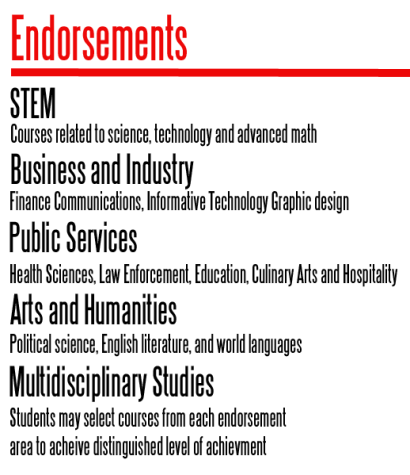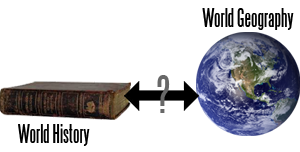Scanning over her course selection sheet, incoming freshman Alexa Petrou circled the courses she wished to take in high school. Along with the classes, she also chose the pathway of study she wanted to take: Business and Industry. Although she knew the decision could affect the rest of her high school career, she decided to use it to her advantage and try to obtain a scholarship to Louisiana State University, the college she had already settled on.
The State Board of Education approved House Bill 5 on June 10, 2013. Districts will implement the bill to schools during the 2014-2015 school year. The bill changes the amount of credits required for students entering high school after the 2013-2014 school year. The bill offers endorsements or career paths for students.
“I think it will help us get an early start and will prepare us for what we will have to expect, so we can really learn from that,” Petrou said.
The bill eliminates several EOC (End of Course) exams including Geometry, Algebra I, English III (both reading and writing), World History, World Geography, Chemistry, and Physics. If a student previously failed one of these tests, they no longer need to retest for that exam. However, if a student failed a currently required exam, they must retake the test.
“During my senior year, I’m going to take extra classes because if colleges like it, then I’m going to do anything to get into the college I want with a scholarship,” Petrou said.
The Bill requires students entering ninth grade to indicate in writing an endorsement, or pathway of study choice. All incoming ninth graders will meet with a counselor to develop a Personal Graduation Plan. The district must allow students to change their plan if they desire it. As of August 14, 2014, students must only complete three years of mathematics, science, and history, instead of the four previously required.
“I think House Bill 5 is going to help students determine what career field to go into,” Guidance Counselor Ms. Vorsino said. “It’s going to help students focus on a career they’re interested in, but it can be confusing when the state changes things around.”
Students will not receive credits for a class unless they attend the class for 90 percent of the days required. This bill reduces the amount of required EOC exams from 15 tests to five, and creates multiple pathways for high school students to earn a diploma.
“I think it’s kind of weird that they are deciding to do endorsements when we’re only fourteen,” Petrou said. “I guess it will help us now to start focusing on a career choice, but we’re barely teenagers, so most likely we’re going to change our minds, then have to start from scratch.”
The legislation eliminated the four-by-four plan that required most high school students to take four classes of English, math, science and social studies, plus other courses such as health, technology, athletics, and communication. The bill creates multiple pathways to earn a high school diploma and gives students more leeway in choosing their courses, depending on whether they plan to continue their education or join the workforce after graduation. Dr. Stephan Shardy, Pre-Cal and Calculus Teacher, does not agree with the bill.
“I do not think other well-educated countries, such as South East Asia and European countries, are minimizing upper-level courses, and I think this is a dangerous trend,” Dr. Shardy said. “When you minimize math, it also affects anything scientific— which is just applied math and technology.”
The more math courses required by the district, the more concepts, such as problem solving, analytical and critical thinking, students will learn to help them in life.
“Any time you diminish specific math and upper-level courses, you’re telling students that problem solving skills are minimized, and students will enter the workforce with less ability to solve problems all the way through, work projects, and use high level critical thinking skills,” Dr. Shardy said. “Newton would have turned over in his grave.”

Students will have to choose between the freshman course, World Geography, and the sophomore course, World History, courses for their freshman social studies class. Ms. Long said they’re completely different courses and that they’re both important.
“I think it would be a huge mistake to have students choose between these two courses,” AP World history teacher Ms. Long said. “If students have to choose, there is no way they’ll be ready for college social studies courses.”





